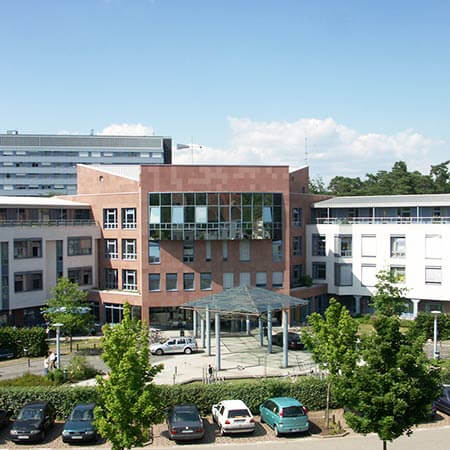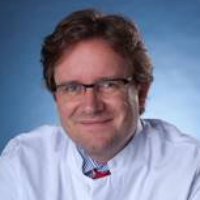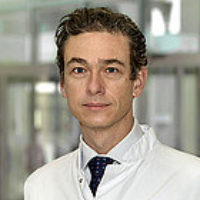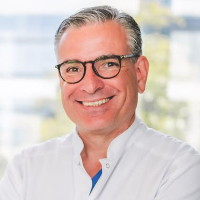Arteriovenous Malformation AVM — Partial Resection and Coiling: treatment in the Best Hospitals in the World
Treatment prices are regulated by national law of the corresponding countries, but can also include additional hospital coefficients. In order to receive the individual cost calculation, please send us the request and medical records.

Department of Adult and Pediatric Neurosurgery, Spinal Surgery
The Department of Adult and Pediatric Neurosurgery, Spinal Surgery offers the full range of services in the surgical treatment of diseases of the central and peripheral nervous system. Of particular interest is the treatment of brain and spinal cord tumors, spinal surgery for herniated discs, spinal stenosis, and degenerative changes in the spine, as well as interventions for neurovascular diseases and hydrocephalus. The doctors have exceptional experience in the surgical treatment of brain tumors, hydrocephalus, craniostenosis, and spina bifida in children. In addition, the department's neurosurgeons brilliantly perform stereotaxic operations on the brain. The department has 69 beds and 4 state-of-the-art operating rooms, including a stereotactic operating room for diagnostic and therapeutic procedures. A competent team of surgeons provides treatment in accordance with the standards and recommendations of the professional societies. The department's neurosurgeons annually admit more than 3,100 inpatients and more than 7,000 outpatients. The specialists not only highly effectively treat diseases of any severity but also make sure that the operation is as sparing and safe as possible.




Department of Adult and Pediatric Neurosurgery, Spinal Surgery
The Department of Adult and Pediatric Neurosurgery, Spinal Surgery offers all the possibilities of modern surgical treatment for diseases of the central and peripheral nervous system in patients of all ages. More than 6,000 surgical procedures are performed annually in the department's high-tech operating rooms. Both planned and emergency neurosurgical procedures are performed here. The department's surgical team focuses on patients with cerebrovascular diseases, brain and skull base tumors, spine and spinal cord diseases, cerebrospinal fluid circulation disorders, and pathologies of the peripheral nervous system. The department's team of physicians also has extensive experience in functional neurosurgery: specialists perform deep brain stimulation for movement disorders, spinal cord stimulation for back pain, and vagus nerve stimulation for epilepsy. The department works closely with neurologists, radiologists, and nuclear medicine specialists to provide patients with the highest level of comprehensive medical care. The department is recognized as one of the top neurosurgical centers in Germany and beyond, as evidenced by consistently high treatment success rates and numerous quality certifications, including the German Cancer Society (DKG) Certificate, the German Spine Society (DWG) Certificate, and the Leading Medicine Guide Certificate.







Department of Neurosurgery and Spinal Surgery
The Department of Neurosurgery and Spinal Surgery offers the full range of modern surgical procedures for patients with diseases of the brain, spinal cord, spine, and peripheral nervous system. The department has state-of-the-art equipment, including navigation systems, monitoring devices, surgical microscopes, intraoperative X-ray diagnostic systems, angiography systems, and laser equipment. In addition, a system for minimally invasive stereotactic interventions has been installed in the department's operating room. The department's neurosurgeons use the latest microsurgical and endoscopic techniques in their work. The medical facility is one of only three in Europe to successfully use the VISUALASE™ device for MRI-guided laser ablation to treat epilepsy. This minimally invasive procedure is highly effective and represents a real breakthrough in epilepsy surgery. The department's neurosurgeons always strive to provide the patient with optimal medical care. They talk in detail about each stage of treatment and are happy to answer the patient's questions. Neurologists and specialists in the field of neuroradiology are often involved in the therapeutic process, which guarantees a comprehensive approach to treatment.

An arteriovenous malformation (AVM) is a pathological "tangle" of veins and arteries. It is a "time bomb" in your brain that may rupture at any moment. The larger it is, the higher the risk of rupture. It is therefore advisable to eliminate large and rapidly growing AVMs. Coiling often becomes the first treatment method prescribed for patients. The procedure is safe and minimally traumatic, although it does not always eliminate the AVM completely. Many patients will also require surgery or radiation therapy after coiling.
You are welcome to use the Booking Health service if you want to undergo endovascular treatment abroad. On our website, you can find out prices, choose a medical care program, and get services for arranging your treatment in developed countries.
Content
- The essence of coiling for arteriovenous malformations (AVMs)
- What will happen if you do not treat a brain malformation?
- Who may be a candidate for AVM coiling?
The essence of coiling for arteriovenous malformations (AVMs)
Brain malformations do not have to be physically removed. It is enough to cease the blood supply to the pathological blood vessels. In this case, there will be no high pressure inside the AVM, and therefore rupture of the vascular wall will not occur.
Embolization is an endovascular procedure performed from inside the blood vessels. A small incision in the groin is enough to approach them. Doctors can reach pathological brain vessels through an arterial network and occlude them with various methods. Coil embolization is often carried out, although there are other methods, such as glue.
Endovascular treatment for cerebral AVMs has the following advantages:
- the procedure is safe;
- the procedure is minimally traumatic;
- no rehabilitation is required;
- no need for prolonged hospitalization;
- almost no postoperative discomfort.
What will happen if you do not treat a brain malformation?
Malformations can be symptomatic or asymptomatic.
If a patient has symptoms, they will not disappear without treatment. Moreover, they will progress as the AVM increases in size. Treatment is therefore always required in such cases.
Asymptomatic malformations up to 2 cm in size are only monitored. However, for patients with larger malformations, treatment is preferable due to the increased risk of rupture. AVMs cause about 10% of subarachnoid hemorrhages and 1% of hemorrhagic strokes. The lifetime risk of rupture reaches 40%, with a 20% risk of death from AVM rupture.
It is better to treat the AVM in a timely manner, before it becomes too large. In this case, successful elimination through endovascular procedures is highly likely, avoiding more traumatic neurosurgical operations.
Who may be a candidate for AVM coiling?
The procedure is suitable for almost all patients in whom the malformation has not ruptured. It is especially recommended for epileptogenic AVMs.
Another question is if the endovascular procedure will be the only treatment method or if it will be a preparatory stage for surgery or radiosurgery.
Complete elimination of brain AVMs using endovascular procedures is possible in 30-35% of cases. These are mainly patients with malformations less than 3 cm in size and a small number of supplying arteries. In other cases, cerebral AVMs only decrease in size, or there is a partial restoration of blood supply over the next few months. In these cases, complete elimination of brain AVMs may require surgical resection or CyberKnife treatment.
Surgery is considered the most reliable treatment option. After embolization, AVM resection becomes safer because the AVM with poor blood supply will not cause severe bleeding.
You are welcome to use the Booking Health service to undergo your diagnostics, embolization, and partial resection of AVMs abroad. On our website, you can find out prices for various procedures and choose a medical care program at a favorable cost. Prices for medical services will be lower due to the absence of additional taxes for foreign patients. The Booking Health specialists will help you select the most suitable hospital and take care of organizing your trip.
Authors:
The article was edited by medical experts, board-certified doctors Dr. Nadezhda Ivanisova and Dr. Vadim Zhiliuk. For the treatment of the conditions referred to in the article, you must consult a doctor; the information in the article is not intended for self-medication!
Sources:

